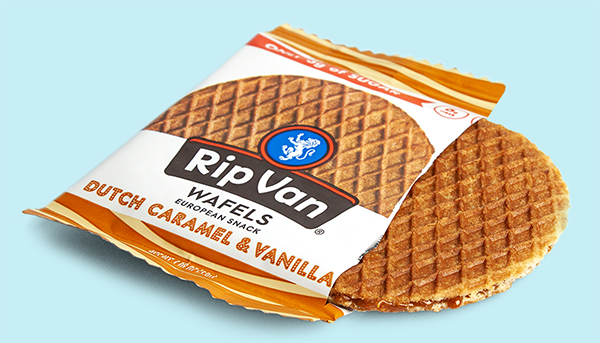Low-Sugar Office Snacks: How Rip Van Is Changing the Game
- By Lex Flamm
- Reading Time: 6 mins.
In 2017, business partners Rip Pruskin and Marco De Leon walked into a factory in Pittsburg, Pennsylvania, with smiles on their faces. They were there to flip the ceremonial switch on the production line for their cookie company, Rip Van. It was a huge moment. Not only would the move send Dutch stroopwafel cookies sailing down the line’s conveyor belt, but it would also take Rip Van’s production to a new level.
The partners counted down with their hands on the switch: “Three…two…one…BOOM!” Flames leapt up from the machinery in front of them and smoke poured into the air.
The Fire That Changed Everything
“Everything started smoking, the fire brigade came—it was like my worst nightmare and I was living it firsthand,” Rip told The FruitGuys later.
That factory fire was a turning point for Rip Van, and ultimately turned it into the snack company it is today. Seven years later, Rip and Marco make tasty, low-sugar snacks like Dutch Caramel & Vanilla Stroopwafels and Chocolate Hazelnut Wafers. Here at The FruitGuys, we’re proud to feature their snacks as our Snacks of the Month for Hispanic Heritage Month in September in a nod to Marco’s Brazilian and Dominican heritage.
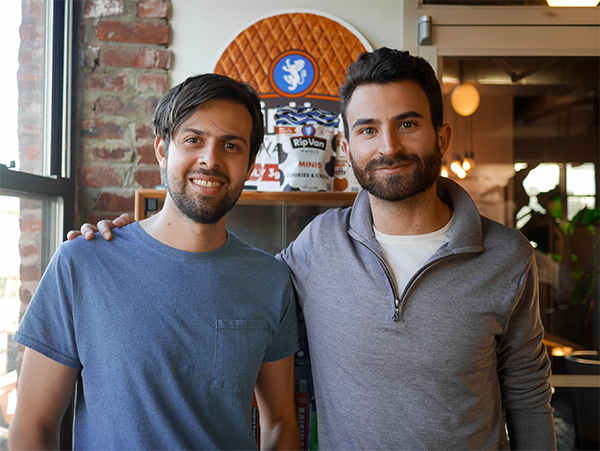
To fully appreciate how the factory fire changed Rip Van’s business, we need to rewind to the beginning and take a trip to Brown University—where its story began.
A Dutch Cookie Like No Other
Rip Van started out as a passion project for Rip. He was born in the US but grew up in India and The Netherlands, where he fell in love with stroopwafels: a traditional Dutch dessert made from two waffle-shaped cookies with sweet, caramel-like filling sandwiched between them.
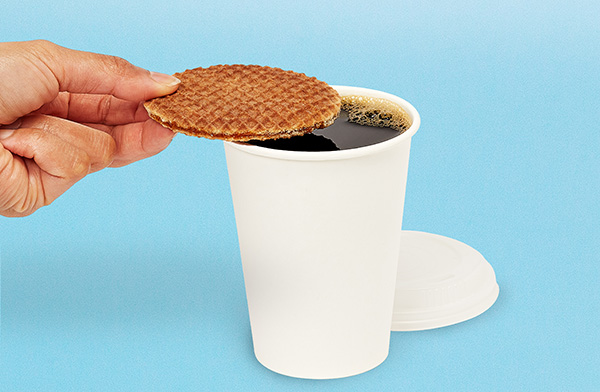
“I think the unique thing about a stroopwafel is its taste and texture,” he explained. “From a texture standpoint, it’s crispy, then chewy, then crispy. That’s a really distinctive experience on its own. From a taste standpoint, stroop—a Dutch form of caramel—is made in a different way [from American caramel]. So it also has a different flavor, texture, and consistency than the ‘normal’ caramel you’d find in a Snickers bar or a Twix.”
When Rip moved back to the US for college at Brown University in 2006, he couldn’t find a good stroopwafel in the grocery store. So, he decided to make his own.
The Recipe for Success
Rip started tinkering with cookie recipes and asked his engineering professor for help designing an assembly line. Then, he met Marco at a college party. Both were studying economics and preparing for careers in finance, but Marco had always wanted to follow in his entrepreneurial father’s footsteps.
The pair talked about cookies over a game of beer pong and Marco was intrigued by Rip’s idea. In 2010, he turned down a job offer at Morgan Stanley to join forces with Rip and start Rip Van (then called Van Wafles) together.
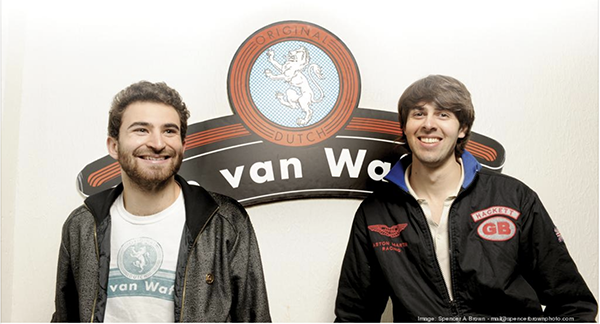
They sold their first cookies to fellow students, then slowly built up to local cafes, then grocery stores across the country. The pair drove store to store in a Volvo station wagon and slept in the car at night to save money. In 2016, Forbes placed Rip and Marco on its 30 Under 30 list.
The future looked bright. A year later, it caught fire.
Rising From the Ashes
No one was hurt in the 2017 factory fire, but Rip and Marco nearly lost their business when their production line short-circuited. In the process of rethinking how they’d make stroopwafels without the right equipment, they ended up rethinking Rip Van completely.
“That cataclysmic event made us think existentially,” Rip said. “… We started asking ourselves, ‘Are we having an impact? Yes, we’re impacting the lives of our employees by treating them well and having competitive salaries, but what are we doing for society?’”
Rip and Marco went back to the drawing board. They dug deep to find a niche for Rip Van, where their cookies could actually help society—and they discovered America’s sugar addiction.
Same Cookie, Less Sugar
According to the American Heart Association, the average American consumes about 17 teaspoons of added sugar every day, which adds up to over 60 pounds per year. That’s almost twice the recommended limit for men (9 teaspoons) and three times the recommended limit for women (6 teaspoons).
About 28% of that sugar comes from desserts, sweet snacks, and candy. When Rip and Marco learned that, they saw an opportunity. If they turned their stroopwafels into low-sugar snacks, they could help people make a healthier dessert swap, lower their sugar intake, and protect their health. So, they got to work on a new recipe.
“We worked with a number of food scientists and PhDs to figure out how to use plant-based ingredients instead of synthetic fillers and sugar alcohols, which have a lot of negative health consequences. We thought, ‘How can we achieve the taste and low sugar?’ It took us a long time. We designed a lower-sugar stroopwafel in increments. Our recipe went from 12–13 grams of sugar, to 8–9 grams, to 3 grams,” Rip said.
Want to try Rip Van's snacks?
We've got you covered.A Real-Life Fairytale
While updating the stroopwafel, Rip and Marco realized they could use the same food technology to make more sweet, low-sugar snacks. Rip Van expanded to sell sandwich cookies (3 grams of sugar) and wafers (2 grams of sugar) in flavors like Cookies and Creme and Chocolate Hazelnut.
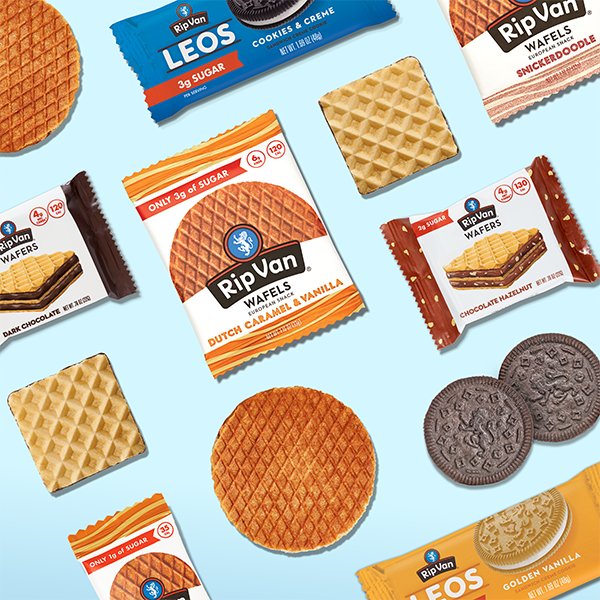
Rip and Marco also changed their company name from Van Wafels to Rip Van in honor of the fairytale.
“Funnily enough, the story of Rip Van Winkle is about a guy who fell asleep, and when he woke up, the world had changed. That’s how we feel about the food industry. It’s been sleeping for a very long time and no one has come around to really disrupt the industry and bring about much better, low-sugar snacks. Rip Van is an awakening to shift that history,” Rip said.
The name caught on, so much so that clients and partners stopped using Rip’s Indian name, Abishe, and started calling him Rip instead.
Why Minority-Owned Matters
Though Abishe is happy to go by Rip in the business world, he and Marco are both proud of their heritage as first-generation Americans. Rip is Indian and Dutch, and Marco is Dominican and Brazilian.
“I think we both grew up with the mentality of hard work and the American Dream,” Rip said. “I had to do it first-hand myself, and ever since Marco was a kid, he saw his dad struggle to start his company, which he has since grown. I think that’s why being a certified Minority Business Enterprise is important to us. When you come to this country without resources and connections and whatnot and need to figure it out, that can be really hard.”
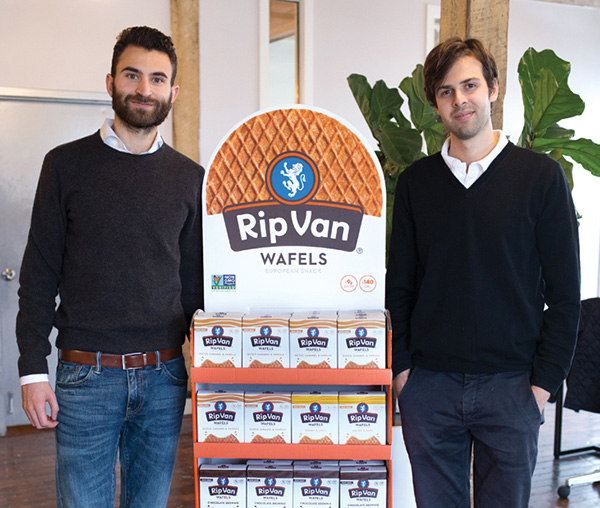
Rip and Marco regularly speak at diversity conferences like the Starbucks Supplier Diversity conference and the National Minority Supplier Development Council (NMSDC) Annual Conference & Exchange to share their story.
“We believe it’s important to pay it forward and inspire the next generation of entrepreneurs,” Marco said.
We at The FruitGuys are proud to feature Rip Van’s Dutch Caramel & Vanilla Stroopwafels and Chocolate Hazelnut Wafers as our Snacks of the Month for Hispanic Heritage Month in September 2024. The month means a lot to Marco as a first-generation Hispanic American.
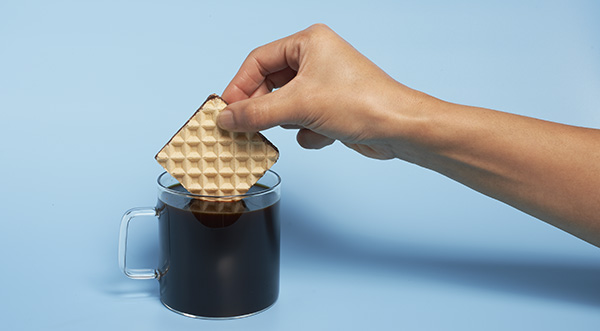
“It’s a celebration of our people and community in the US. It says that we, like any other group of people, have the right to pursue the American Dream and contribute to our society and great country,” he said.
How to Start Snacking
You can find Marco and Rip’s low-sugar snacks among the variety of treats in our Thoughtful Snack Boxes all month long, or order them by the case. Buying a case is a great way to support Rip Van and share their snacks with your team when you celebrate Hispanic Heritage Month. Pass them out while you listen to a Hispanic speaker or discuss a book by a Hispanic author. However you celebrate, sharing Rip Van’s story will make it even more meaningful.
